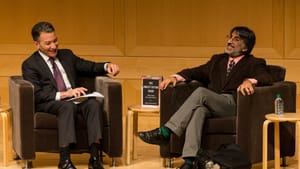Stay in the Loop
BSR publishes on a weekly schedule, with an email newsletter every Wednesday and Thursday morning. There’s no paywall, and subscribing is always free.
Happy birthday, Bill of Rights
The National Constitution Center's Bill of Rights Day

On Thursday, December 15, our country celebrated the 225th anniversary of the ratification of the Bill of Rights. The National Constitution Center commemorated the day by featuring 'round-the-clock activities such as a public reading of the Constitution’s first 10 amendments, a Bill of Rights birthday cake, and a special appearance by “James Madison.”
Much to my delight, there was also a station where participants could color and fold their very own amendment-themed cootie catcher (here’s a quick reference for those unfamiliar with this classic DIY kids’ toy). I couldn’t resist folding one of my own and playing a round before heading into the day’s festivities. Each time I picked a number (1-10), I challenged myself to remember the corresponding amendment. After only three or four crumply turns, I was stuck and embarrassed. How could I not know our nation’s first 10 amendments? Luckily, I was in the best place to find answers.
Bill of Rights 101
The highlight of the day was the Bill of Rights Day Book Festival, featuring four back-to-back discussions on today’s biggest constitutional debates, including gun control, the death penalty, and other contemporary issues.
While attendance waned throughout the day, the best content came last: an hour-long conversation with leading legal scholar Akhil Reed Amar, an author and law and political science professor at Yale University. And, fun fact for West Wing fans: he was an informal consultant to the show.
Amar began the session with a quick 101 for the audience: in short, the first 10 amendments to the U.S. Constitution make up our Bill of Rights. Championed by James Madison, the amendments are specific prohibitions on governmental power to protect people’s individual, unalienable liberties. Amar then goes on to share the lesser-known but important detail that Madison initially opposed the idea. Fearing a list of rights might dangerously imply anything not listed was not a right (note: later this concern would be addressed via the Ninth Amendment), Madison denounced it. However, as the Constitution was ratified, Madison eventually pivoted and joined the effort to “make amends” for lapses in our Constitution.
Thinking Constitutionally
During the conversation, moderator and National Constitution Center president Jeff Rosen pointed out the Oxford Dictionary recently announced “post-truth” as its 2016 word of the year. Amar insists this is exactly where Madison’s pivot on the Bill of Rights must not be overlooked because it is “a great example of being able to be persuaded.” He suggests if we view modern issues through a Constitutional lens, then we can place reason over partisanship. We can follow in Madison’s footsteps and use the Bill of Rights as common ground to “talk across the divide.”

When Amar finished speaking, Bea, a bubbly and sharp-witted woman sitting next to me, cooed, “Isn’t he a rock star? I love hearing Amar speak in person!” She also showed me the pocket-sized Constitution she carries in her purse. She is a shining example of an American empowering herself to navigate conversations about our country’s issues. Figuring it was time for me to drop the cootie-catcher games and move on to more advanced material, I went ahead and got myself a copy. (You can download an interactive, digital version here).
James Madison said, “Knowledge will forever govern ignorance; and a people who mean to be their own governors must arm themselves with the power which knowledge gives.” In a political climate where fake news spreads through newsfeeds faster than weeds in a garden, and with many folks gung-ho about sticking to their beliefs regardless of facts, figures, or other evidence to the contrary, perhaps finding a way back to the fundamental thinking of the Founding Fathers might be useful, if not crucial. Instead of just memorizing the first 10 amendments (or, heck, 27 of them), what would happen if we attempted to more deeply understand them? As we inch our way closer to a new year and a new presidency, here’s to all of us engaging and thinking more critically about our nation and its founding principles.
What, When, Where
Bill of Rights Day. December 15, 2016 at the National Constitution Center, 525 Arch St., Philadelphia. (215) 409-6600 or constitutioncenter.org. A related exhibition, Constituting Liberty: from the Declaration to the Bill of Rights, remains on display through fall 2017.
Sign up for our newsletter
All of the week's new articles, all in one place. Sign up for the free weekly BSR newsletters, and don't miss a conversation.

 Brittany Barbato
Brittany Barbato